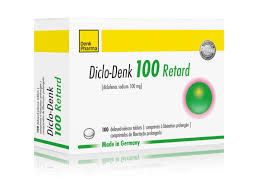Diclo-Denk 100mg Tablets are a formulation of Diclofenac Sodium, a nonsteroidal anti-inflammatory drug (NSAID) used for the treatment of pain and inflammation. Each tablet contains 100 mg of Diclofenac Sodium and is commonly prescribed for various inflammatory conditions.
Key Features
- Active Ingredient: Diclofenac Sodium (100 mg per tablet)
- Formulation: Oral tablet, typically available in packs of 10 tablets.
Indications
Diclo-Denk is indicated for:
- Pain Relief: Effective in managing mild to moderate pain, including:
- Headaches
- Muscle aches
- Dental pain
- Pain associated with osteoarthritis and rheumatoid arthritis
- Dysmenorrhea (menstrual cramps)
- Inflammation Management: Used for treating:
- Acute joint inflammation (e.g., gout attacks)
- Chronic inflammatory conditions such as rheumatoid arthritis and ankylosing spondylitis
- Inflammatory soft tissue rheumatisms
Dosage and Administration
- Recommended Dosage: The usual adult dosage is typically between 50 mg and 150 mg daily, depending on the severity of the condition. For many patients, one tablet of Diclo-Denk (100 mg) may be taken once daily.
- Administration Instructions: Swallow the tablet whole with plenty of fluids. It is advisable to take it with food to minimize gastrointestinal irritation.
Side Effects
Common side effects may include:
- Gastrointestinal issues (nausea, vomiting, diarrhea, abdominal pain)
- Dizziness or headache
- Fluid retention or swelling
Serious side effects can include:
- Gastrointestinal bleeding or ulcers
- Liver or kidney impairment
- Allergic reactions (e.g., rash, swelling, difficulty breathing)
If severe reactions occur, discontinue use immediately and seek medical attention.
Precautions
- Contraindications: Not recommended for individuals with known hypersensitivity to Diclofenac or other NSAIDs, active gastrointestinal bleeding, or severe heart failure.
- Caution Required: Use with caution in patients with existing cardiovascular disease, liver or kidney impairment.
- Pregnancy and Breastfeeding: Generally contraindicated during pregnancy, especially in the third trimester; consult a healthcare provider before use if breastfeeding.



